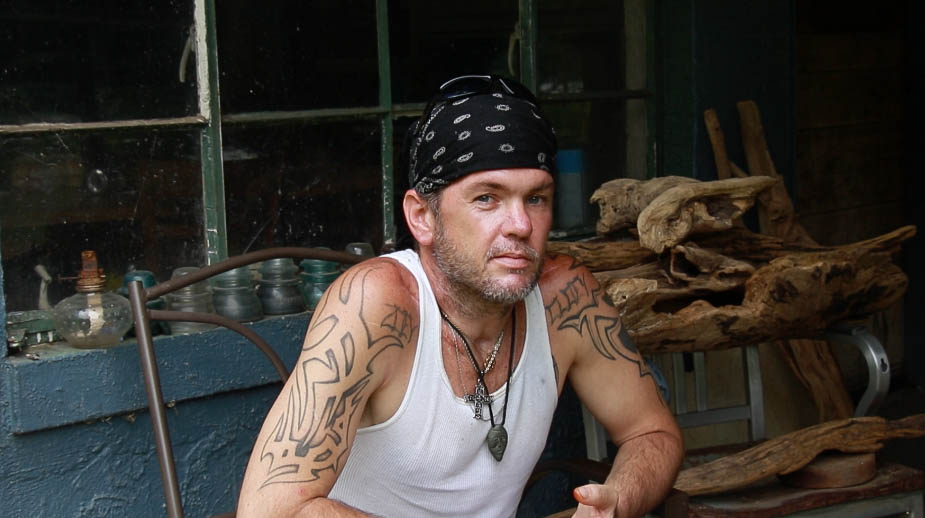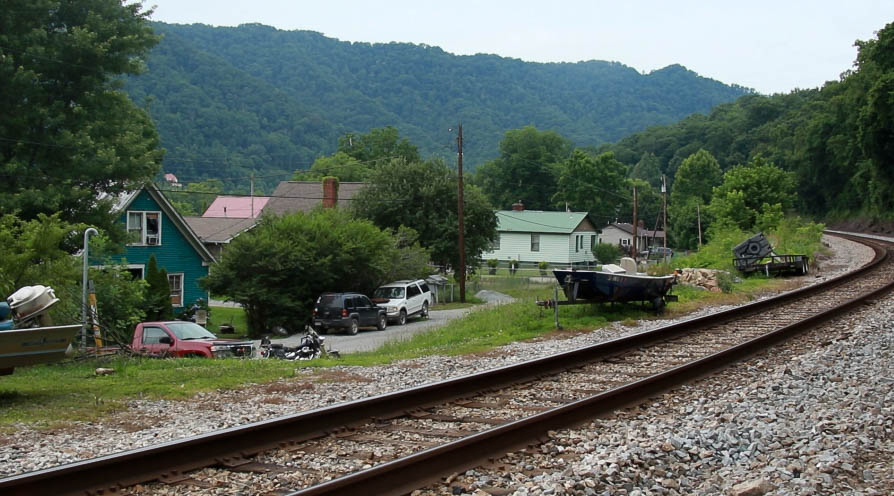W.Va. communities must patch up leaks, broken water pipes themselves

Jessica Griffith, a resident of Garwood, West Virginia, holds her youngest son. She said she used the community’s water to prepare his bottle for nine months before learning the water wasn’t being treated. (Photo by Jordan Houston/News21)
GARWOOD, W.Va. – In southern West Virginia, hundreds of unqualified residents must now run their local water systems, which often draw water from abandoned mines.
As the state has lost coal-industry jobs, the miners who once ran these systems have abandoned this task to the remaining residents.
Environmental Protection Agency data shows that at least eight communities have no water operators, and residents say they face frequent outages and taps that deliver muddy water after heavy rains.
Some Wyoming and Fayette county residents said they are getting too old to continue upkeep on the systems and lack the funds to carry out proper treatment.
In Garwood, a 55-person Wyoming County town surrounded by coal mines, residents have struggled to keep their system afloat after it was deserted in 2014.
“Everybody just up and quit,” resident Jessica Griffith said. “There was no warning, no nothing. Nobody handed it over to anybody else.”
Since then, the mother of five and her neighbors have been paying to patch up leaks and fix busted pipes themselves. The community has had frequent water outages for nearly two years. Last November, Garwood went more than three weeks without water because the reserve in the mine was too low. Many residents had to shower in nearby towns, Griffith said.
Griffith said the community can’t afford to test its water, so residents have no way of knowing if it’s safe to drink.
“You don’t really know what you’ve come in contact with,” Griffith said. “Even just like animal feces, you can’t keep that from not getting in the water when it’s coming out of the ground like that.”
Garwood residents rely on bottled water donations they received from a church in Virginia. Griffith stores a large pack in her garage, which she leaves open for her neighbors. The community is down to its last row of bottles.
Two hours north, Kanawha Falls residents also face uncertainty with their drinking water. The town, known for its roaring waterfalls, has relied on volunteers to run the community water system for as long as anyone can remember, residents said.
Bobby Kirby, 80, has helped out as the system’s treasurer for more than a decade. He said he collects money from residents to pay for chlorine to dump into the storage tank, which sits half a mile up on a mountain that houses an abandoned coal mine. However, Kirby said he hasn’t tested or treated the water in years.
“We just don’t have the money to do it,” Kirby said. “It just got too expensive. Nobody was paying the bill to do it, so we just quit it.”

Kanawha Falls, West Virginia, resident Joe Underwood, who recently recovered form skull surgery, said he’s too afraid to drink his own water. His doctor told him not to drink or bathe in the town water to avoid infection from contamination. (Photo by Jordan Houston/News21)
Resident Joe Underwood, who recently had skull surgery after a four-wheeler accident, said he won’t drink or bathe in the town’s water. He said doctors told him the water gave him two infections near his brain following his surgery. Underwood said he now only drinks bottled water and showers with a cap.
“I just finally realized the importance of the type of water that’s coming in,” Underwood said. “I’m meaning that for people that have serious injuries. I’m meaning that for little babies. I’m meaning that for anybody that has any kind of health problems.”
According to EPA data, a number of other communities in the southern part of the state struggle with similar problems. The state’s Office of Environmental Health has placed many of these communities on boiled water advisories.
The West Virginia Infrastructure and Jobs Development Council, the agency responsible for improving infrastructure across the state, announced projects to link Kanawha Falls and Garwood to surrounding city water systems.
However, Susan Small from the Public Service Commission, which oversees economic regulation for the state’s public utilities, said these types of projects are expensive.
“If money wasn’t an issue, we could extend water systems everywhere,” Small said. “But the topography in the mountainous terrain of West Virginia makes extending a mile of water line much more expensive than, say, Ohio.”
Officials expect to connect Kanawha Falls – a project that cost $1.8 million – by the end of the summer. Garwood will receive funding if the council has leftover money from another waterline extension project in a neighboring town, officials said.
Griffith said she has doubts Garwood will be hooked up to city water any time soon.
“We should be able to turn on the faucet and there’s water and not have to go day-by-day wondering if I’m going to have water today or if I’m going to have to drive down the road and give my kids a bath.”

Kanawha Falls, home to 55 residents, dates back to the Civil War. Union soldiers occupied the West Virginia town during the war and handed the water system over to residents after it ended. (Photo by Jordan Houston/News21)
To see the full News21 report on “Troubled Water,” go to troubledwater.news21.com on Aug. 14.